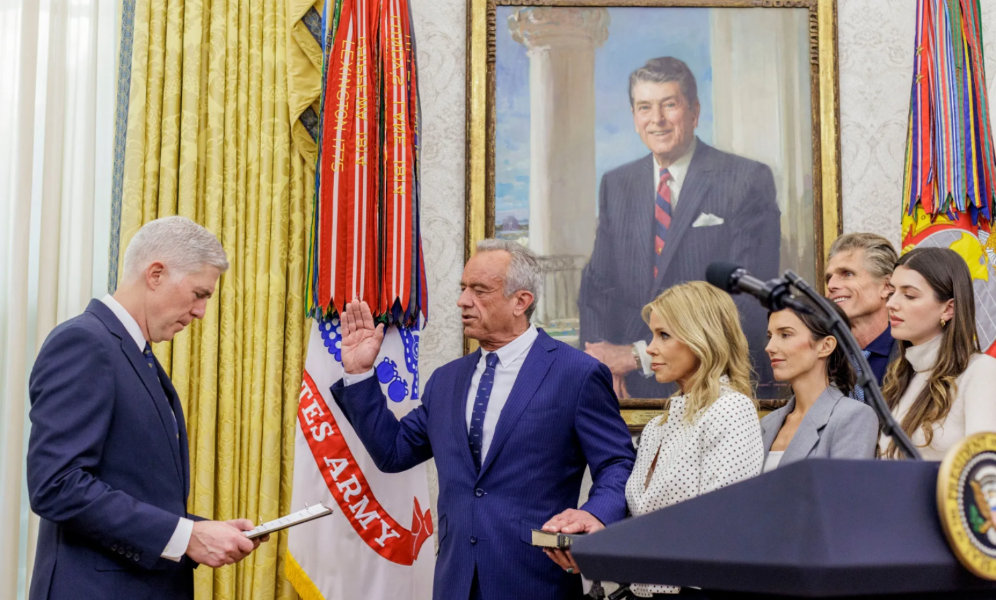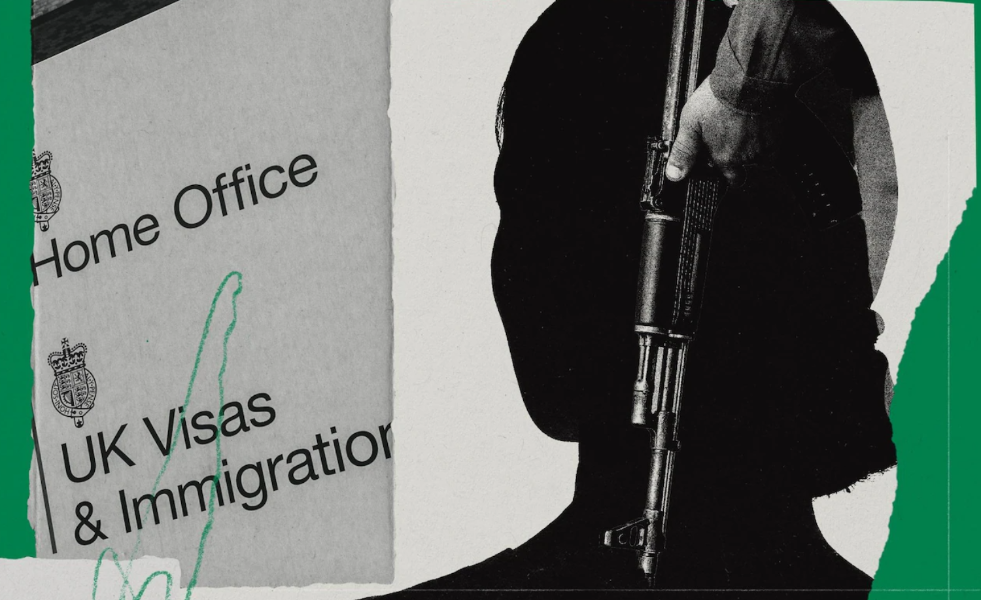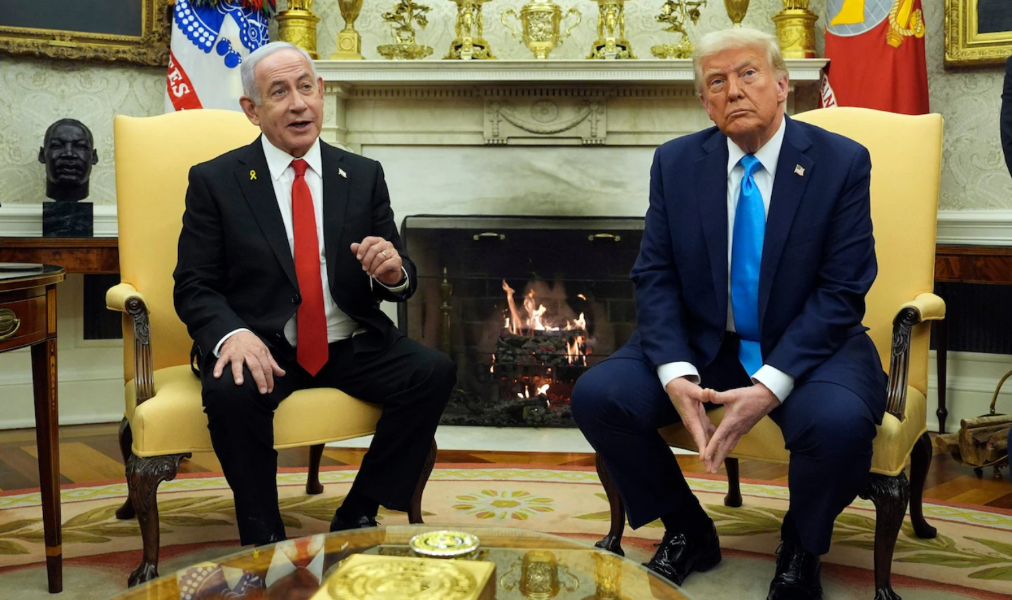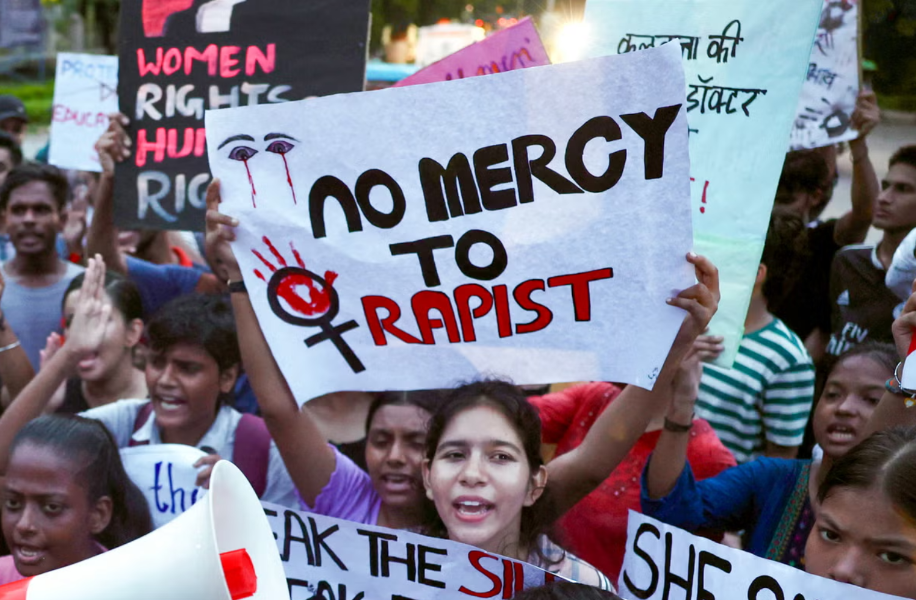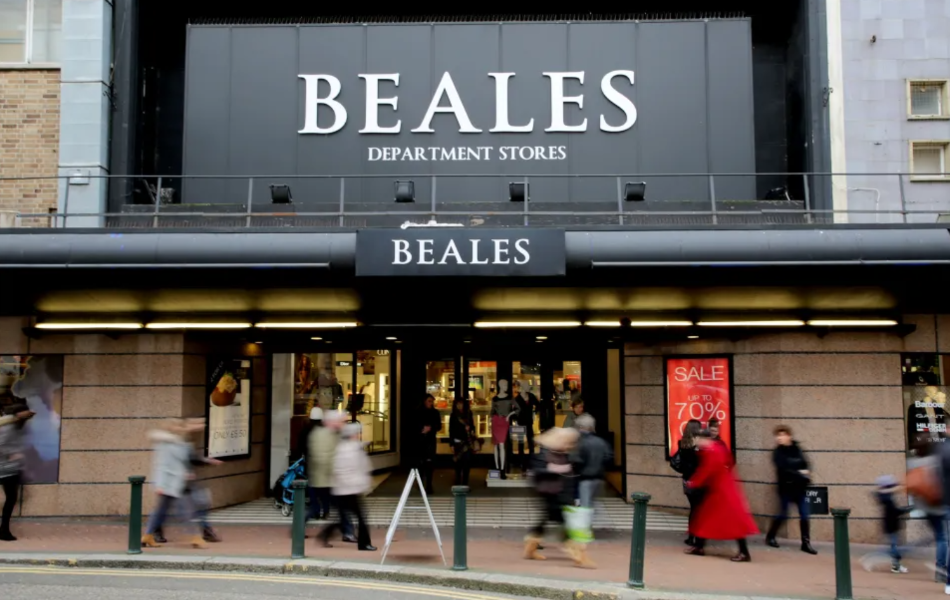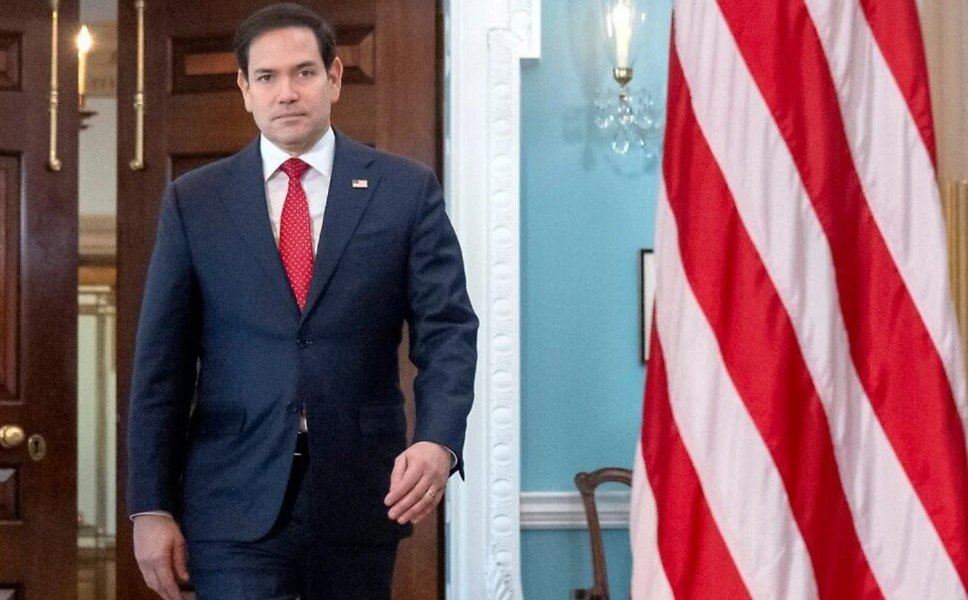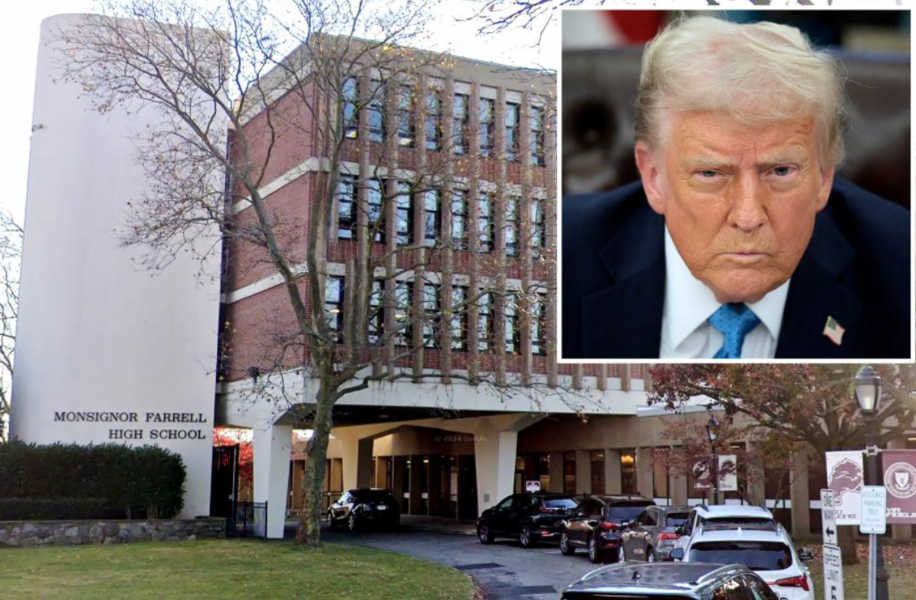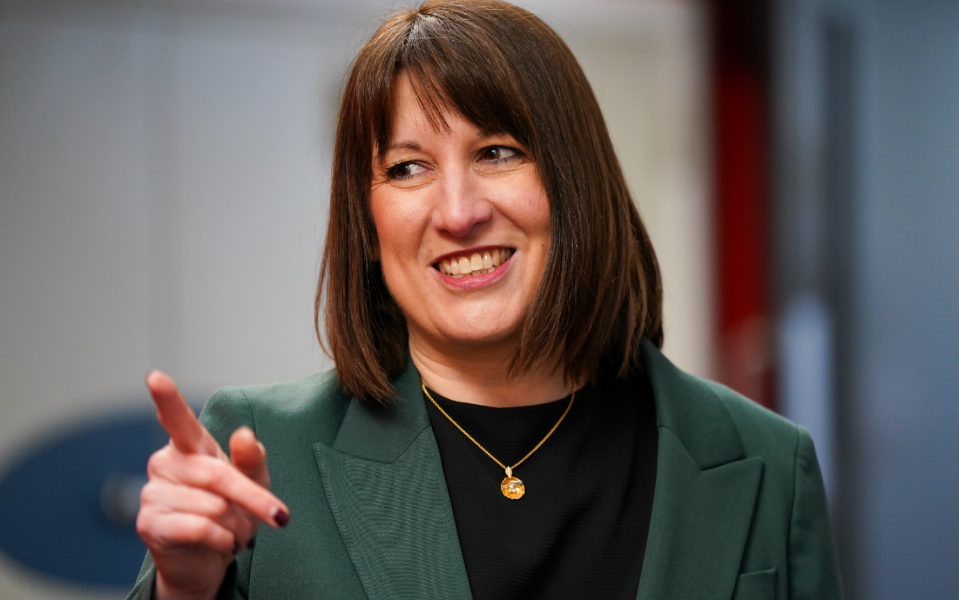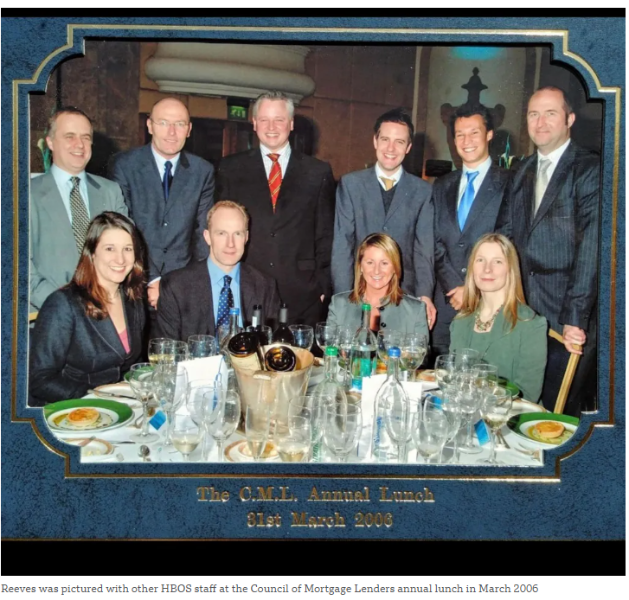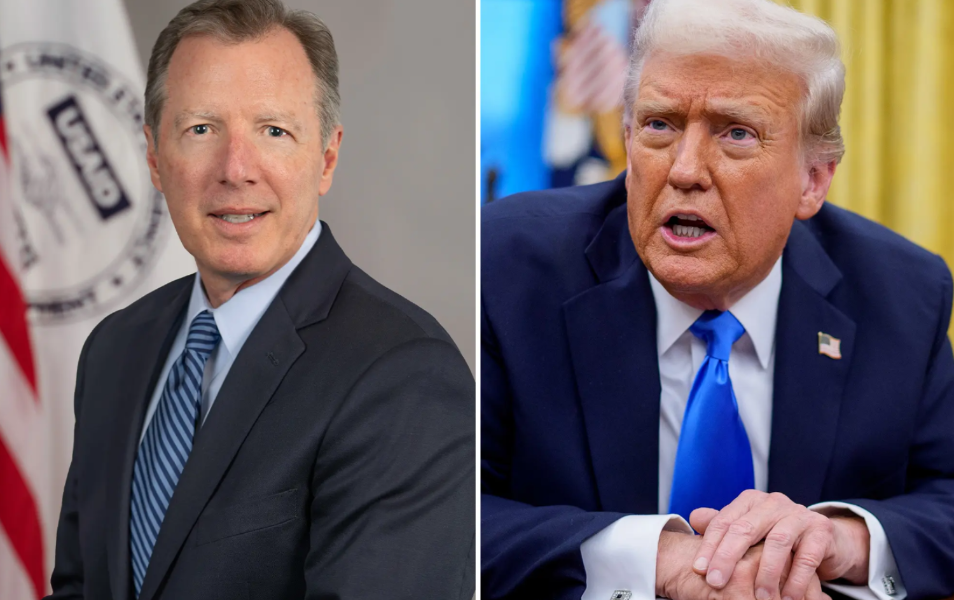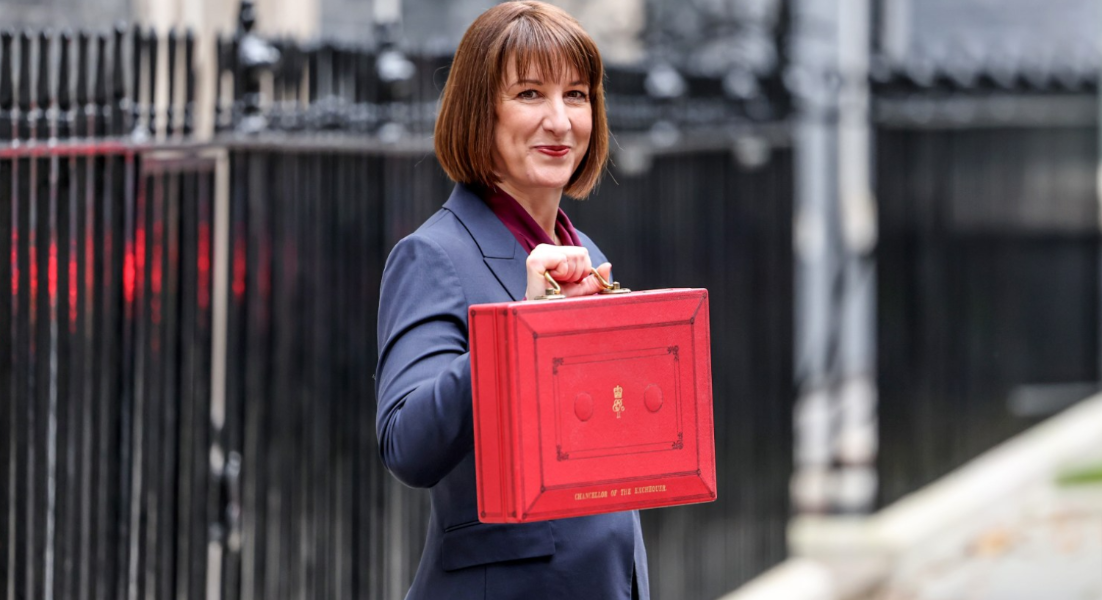-
Posts
10,746 -
Joined
-
Last visited
Content Type
Events
Forums
Downloads
Quizzes
Gallery
Blogs
Everything posted by Social Media
-
//Locked// If you send me a PM with credible links to those claims I can edit it and re open it again for you
-
Robert F. Kennedy Jr., one of President Donald Trump’s most debated cabinet selections, has officially been sworn in as the U.S. Health and Human Services Secretary. The former presidential candidate will now oversee key health agencies, managing approximately 80,000 employees and a budget of nearly one trillion dollars. His confirmation comes despite widespread skepticism from both sides of the political aisle due to his history of controversial health claims and vaccine skepticism. Kennedy was confirmed in a narrow 52-48 Senate vote on Thursday, with no Democrats supporting his nomination. Among Republicans, former Senate Majority Leader Mitch McConnell was the only one to vote against him. Trump personally swore Kennedy in at the Oval Office, marking another key victory in his broader effort to restructure multiple levels of government. The Senate is working long hours to finalize the president's cabinet, with lawmakers also confirming Brooke Rollins as head of the Department of Agriculture in a 72-28 vote. Kennedy becomes the second contentious cabinet pick to be confirmed this week, following Tulsi Gabbard’s appointment as Director of National Intelligence in another closely contested vote on Wednesday. He will now take charge of vital health agencies, including the Centers for Disease Control and Prevention (CDC), the Food and Drug Administration (FDA), the National Institutes of Health (NIH), and the Centers for Medicare and Medicaid Services. His responsibilities will extend across food safety, pharmaceuticals, public health, and vaccinations. Having previously run for president in 2024 as an independent, Kennedy eventually withdrew from the race and endorsed Trump. His appointment to the top federal health position has raised concerns among both Republicans and Democrats. Many lawmakers have questioned his past statements on vaccines, his association with organizations that promote unverified health claims, and his shifting stance on abortion. Kennedy is the founder of Children's Health Defense, an anti-vaccine group that has gained prominence by casting doubt on childhood immunizations and promoting the widely discredited claim that vaccines are linked to autism. Despite this, Kennedy has denied being anti-vaccine, emphasizing that his own children are immunized. During his confirmation hearings, he argued that he merely advocates for stricter safety testing and more comprehensive research on vaccines. Some Republicans have expressed support for Kennedy, particularly for his criticism of food additives and his stance against the pharmaceutical industry. However, his confirmation hearings were marked by intense scrutiny, including sharp questioning on his promotion of health misinformation and his qualifications to oversee the nation’s healthcare system. One of the most contentious moments came when Kennedy was asked about his stance on abortion. While he has previously indicated support for abortion rights, he told lawmakers that he agrees with President Trump in leaving abortion policy to individual states and stated that "every abortion is a tragedy." His comments drew backlash from Democrats, who accused him of abandoning his pro-choice position to secure the nomination. The hearings were not without public spectacle, as protesters interrupted proceedings with shouts of opposition. However, Kennedy also received applause when he vowed to "make America healthy again," echoing a slogan frequently used by the Trump administration. Based on a report by BBC 2025-02-14
-

BBC with a brutal takedown of Ukrainian hopes
Social Media replied to theblether's topic in The War in Ukraine
@bannork please cease copy and pasting articles and text blocks that are well over fair use policy and additionally contain no credible link to them. 27. You will not post any copyrighted material except as fair use laws apply (as in the case of news articles). Only post a link, the headline and three sentences from the article. Content in the public domain is limited to the same restrictions. -
A Nigerian woman who had her asylum claims rejected eight times has finally been allowed to stay in the UK after joining a terrorist organisation to strengthen her case. Despite acknowledging that her political beliefs were not genuine, a judge ruled that her association with the Indigenous People of Biafra (IPOB) meant she could not be safely returned to Nigeria. The 49-year-old woman first arrived in the UK in 2011 and began her involvement with IPOB in 2017. The group, which has been blamed for violent acts against the Nigerian state, is banned as a terrorist organisation in Nigeria but is not proscribed in Britain. In her ninth attempt to claim asylum, she argued that her membership in IPOB and participation in protests placed her at risk of persecution if deported. Upper Tribunal Judge Gemma Loughran accepted that the woman had only joined IPOB “in order to create a claim for asylum” and that her political activism was not genuine. However, the judge ruled that her actions had led to an “imputed” political opinion, meaning the Nigerian authorities could still perceive her as a threat. As a result, she was granted asylum under human rights laws. The case, disclosed in court documents obtained by *The Telegraph*, is one of several controversial immigration rulings that have sparked debate over the UK’s asylum system. Other recent cases include an Albanian criminal avoiding deportation due to his child’s dietary preferences and a Pakistani man convicted of child sex offences who was allowed to stay because deportation would be “unduly harsh” on his children. During Prime Minister’s Questions, Sir Keir Starmer addressed concerns over judicial decisions in immigration cases, calling them “wrong” and emphasizing that Parliament should set immigration laws, not judges. He pledged that Home Secretary Yvette Cooper would take steps to close legal loopholes that allow such rulings. Chris Philp, the shadow home secretary, condemned the decision in the Nigerian woman’s case, calling it “patently absurd.” He argued that judges were exploiting broad interpretations of the European Convention on Human Rights (ECHR) to prevent deportations. “This is an abuse of the power judges have been given to interpret vague ECHR articles,” he said. “It is clear to me that a radical overhaul of human rights law is needed in order to end this abuse by the judiciary – who have taken for themselves what amounts to legislative powers.” The controversy also echoes previous instances where asylum seekers have reportedly converted to Christianity or falsely claimed persecution based on their sexuality to strengthen their cases. The Nigerian woman’s previous asylum claims spanned a decade, including appeals based on family life under ECHR Article Eight and allegations of being a trafficking victim. All were rejected. However, in her final appeal, she argued that Nigerian authorities monitored IPOB protests, including those held at the Nigerian High Commission in London. Her claim was supported by IPOB’s UK-based medical director, who confirmed her involvement in the organisation. While Lower Tribunal Judge Iain Burnett initially dismissed her claim due to insufficient evidence of her activism, Judge Loughran later overturned the decision. She acknowledged that the woman had no genuine political commitment to IPOB but ruled that Nigerian security forces would likely perceive her as an activist and target her upon her return. “The security services act arbitrarily and arrest, harm, and detain those it believes may be involved with IPOB without conducting an assessment of the extent of their involvement or their motivation,” Judge Loughran stated. “The appeal is allowed on the basis that [the Nigerian woman] has a well-founded fear of persecution on account of her imputed political opinion arising from her involvement with IPOB in the UK.” This ruling has intensified calls for reforms to prevent asylum seekers from manipulating the system through questionable claims, with critics arguing that UK immigration laws need urgent tightening. Based on a report by Daily Telegraph 2025-02-14
-
A British immigration judge who recently ruled in favor of granting a Palestinian family the right to live in the UK has come under scrutiny due to his father’s outspoken views on Israel. Judge Hugo Norton-Taylor approved a family of six seeking refuge from Gaza to remain in Britain, despite their application being submitted through a scheme designed for Ukrainian refugees. Based on a report by Daily Telegraph 2025-02-14
-
John Bolton argues that it is time to abandon the long-standing two-state solution for Gaza and instead take a new approach to handling the Palestinian refugee crisis. He believes that the United Nations Relief and Works Agency (UNRWA) should be dismantled, and the responsibility for Palestinian refugees should be transferred to the UN High Commissioner for Refugees (UNHCR), treating them as all other displaced populations have been handled since World War II. Donald Trump’s recent comments on Gaza, made after his February 4 meeting with Israeli Prime Minister Benjamin Netanyahu, have sparked widespread debate. While his remarks seemed impromptu, they were, in fact, prepared in advance. As usual, Trump deviated from the script, at one point musing about the possibility of the United States exerting military control over Gaza. White House officials quickly walked back these statements, only for Trump to reverse course once again, insisting he was serious about American involvement—though without the use of force. Bolton clarifies that he has never advocated for deploying the U.S. military in Gaza. The controversy surrounding Trump’s statements has overshadowed the fact that he touched on two distinct issues. First, and most controversially, he suggested that Israel could hand over control of Gaza to the United States, which would then “own” it and transform it into “the Riviera of the Middle East.” Second, and more significantly, he questioned whether keeping Gaza’s population confined to the Strip was a viable long-term solution. This second point is crucial in assessing Trump’s position—at least until he changes it again. Trump’s vision of an American-controlled Gaza is unrealistic. It lacks any serious strategic foundation and instead echoes his previous, equally impractical suggestion to North Korean leader Kim Jong Un that the country’s beaches could become lucrative resort destinations. That idea never materialized, and the same can be expected for Gaza. Investors and laborers will not flock to rebuild an area still plagued by instability. As Hamas regains control during the current ceasefire and hostage exchanges, Israel is likely to resume military operations once these exchanges conclude. Until Gaza is fully stabilized, no grand reconstruction project can take place. Historically, Gaza’s existence as a distinct political entity is an accident of war, stemming from the military realities at the end of the 1948 Arab-Israeli conflict. Economically, it is not self-sufficient and lacks the resources to become a thriving state. Trump’s second suggestion—that resettling Gaza’s population elsewhere should be considered—has been discussed by various sources long before his February 4 comments. If implemented, it would mark the definitive end of the two-state solution. Even before Hamas’s brutal attack on October 7, the concept of a Palestinian state had lost credibility. Afterward, Israeli support for the idea virtually disappeared. Yet, in the absence of a new framework, the two-state proposal has remained the default position in diplomatic circles. That time has now passed. Bolton argues that the Palestinian state concept was flawed from the start. It was an artificial construct, championed by radical Arab leaders like Egypt’s Gamal Abdul Nasser, and lacked both economic viability and resistance to terrorist control. If the two-state model is no longer viable, an alternative must be found. Bolton previously proposed a “three-state” solution, in which Gaza would be returned to Egypt, while Israel and Jordan would divide sovereignty over the West Bank. This arrangement, he contends, would provide security for Israel while integrating Palestinians into stable economies. However, due to decades of political manipulation, neither Egypt nor Jordan has been willing to assume control over Palestinian populations they see as potentially destabilizing. But simply rebuilding Gaza in its current form is not the answer either. The cost of clearing debris, eliminating Hamas’s underground tunnel network, and reconstructing infrastructure would be enormous—and, as history suggests, would likely lead to another October 7 in the future. That outcome is unacceptable. A better solution, Bolton argues, is to overhaul the way Palestinian refugees are treated. He calls for the abolition of UNRWA, which he describes as an extension of Hamas and the Palestinian Authority, and for Palestinian refugees to instead be handled by UNHCR. Under UNHCR guidelines, refugees are either repatriated to their home countries or resettled elsewhere—never left in indefinite limbo. Unlike UNRWA camps, UNHCR refugee settlements do not last forever. This shift, he insists, would not harm Palestinians but instead grant them the same humanitarian treatment afforded to all other refugees over the past seven decades. Although transitioning to the UNHCR model will be difficult, Trump’s recent comments have opened the door to a necessary discussion on finding a lasting resolution for Gaza’s displaced population. Based on a report by The Times 2025-02-14
-
With Labour MPs Suspended Over Leaked WhatsApp Group Messages. The Times has obtained the complete transcript of a Labour Party WhatsApp group chat, revealing half a million words exchanged between 2019 and 2022. The private group, known as "Trigger Me Timbers," consisted of around 16 members, but leaked excerpts have resulted in the suspension of two Labour MPs, Oliver Ryan and Andrew Gwynne, as well as a dozen councillors. The messages range from routine campaign discussions to highly offensive comments, including racist, sexist, and derogatory remarks. The group often engaged in attacks on party members, particularly those on the left. In some instances, members ridiculed an autistic colleague, while others encouraged spreading false rumors about a gay Labour MP engaging in "sex parties." Oliver Ryan took aim at Richard Burgon, who served as shadow justice secretary under Jeremy Corbyn, stating that in one interview, Burgon "sounds so thick." When Andrew Gwynne learned that Burgon had publicly praised him, he responded sarcastically, saying: "Am about to disinfect myself. My career is over." Ryan also referred to MP Marsha de Cordova, who has a visual impairment, as "the blind one from Battersea." Gwynne replied: "Or did you mean Marsha? That’s so disablist!!! Appalled Oliver." Ryan then mockingly imitated Jeremy Corbyn’s style of reading letters during Prime Minister’s Questions, writing: "Marsh[a] from Battersea wrote to me and said, I can’t find my way out of the office send help." Diane Abbott, the first Black MP to represent her party at Prime Minister’s Questions, was also ridiculed. Gwynne remarked that she was chosen for the occasion "because it’s Black History Month." When another member suggested alternative choices, including David Lammy or the "corpse of Bernie Grant"—one of Britain’s first Black MPs—Gwynne responded with: "Or Desmond Swayne? Justin Trudeau." This was a reference to the Tory MP and Canadian Prime Minister, both of whom had previously caused controversy for wearing blackface. Another message saw a group member urging Gwynne to spread false rumors about a gay Labour MP "having sex parties" with "decrepit trade unionists." Gwynne simply responded: "Haha." He also made disparaging remarks about his own constituents. Speaking of one, he wrote that he had "positive visions of him getting mown down" by a bin lorry. In another instance, he described an encounter with a constituent who criticized the party’s lack of local work. Recounting the exchange, Gwynne claimed he replied: "It is a shithole and you fucking well live in it!" before walking away and flashing a rude gesture at the woman when she asked him to repeat himself. At another point in the chat, Gwynne used the term "illiterate retard" to insult someone. Other MPs targeted in the group included Rachael Maskell and Dawn Butler. Laura Pidcock and Sam Tarry, both of whom were prominent left-wing MPs under Corbyn but later lost their seats, were mocked as "Cockpid" and "trotty," respectively. Additionally, a future MP who later entered Parliament was referred to in the chat as "a lying fat useless bastard." The revelations have sparked outrage within the Labour Party and beyond, leading to the suspension of Ryan and Gwynne. The full impact of these messages on their political careers remains to be seen, but the leaked transcript has already dealt a serious blow to their reputations. Based on a report by The Times 2025-02-14
-
A 40-year-old man who was convicted of raping his wife, a minor, and causing her death has been freed by an Indian court, which ruled that marital rape is not a crime under the country’s laws. The man had been sentenced to ten years in prison in 2019 after being found guilty of rape, “unnatural” sex, and culpable homicide not amounting to murder. The case dates back to 2017 when the man was arrested following his wife’s death. Before she passed away, she made a dying declaration stating that she had been forced to have sex with her husband and had suffered severe injuries as a result. She was taken to the hospital but succumbed to her injuries the same day, according to legal media outlet Live Law. However, the Chhattisgarh High Court has now overturned the conviction, citing the country’s laws on sexual acts within marriage and ordering the man’s immediate release. Justice Narendra Kumar Vyas, who presided over the case, stated that “if the age of wife is not below age of 15 years then any sexual intercourse or sexual act by the husband with his wife cannot be termed as rape under the circumstances, as such absence of consent of wife for unnatural act loses its importance.” This ruling appears to contradict a landmark Supreme Court decision from October 2017, which raised the age of marital rape from 15 to 18. The man’s defense team argued that there was no legally admissible evidence against him and that the conviction had been based solely on the woman's dying declaration. They also contested the cause of her death, claiming that the trial court had ignored testimonies from two witnesses who stated that she had suffered from piles since her first childbirth, which allegedly caused her bleeding and abdominal pain. The ruling has reignited the debate over marital rape laws in India. Last year, the Indian government opposed calls to criminalize non-consensual sex within marriage, arguing that such a move could disrupt conjugal relationships and “disturb the institution of marriage.” The federal Home Ministry told the Supreme Court that while a husband does not have the right to violate his wife’s consent, classifying such an act as “rape” would be “excessively harsh and therefore disproportionate.” The decision to overturn the conviction has sparked widespread criticism, with legal experts and activists questioning how a law meant to protect women could be interpreted in a way that denies justice to victims of marital rape. The case highlights ongoing legal and societal challenges in India’s fight for gender equality and the recognition of marital rape as a criminal offense. Based on a report by The Independent 2025-02-14
-
Sinn Fein’s first minister of Northern Ireland, Michelle O’Neill, has turned down an invitation from King Charles III to stay overnight at Windsor Castle following a private dinner with leaders of the devolved nations. The Telegraph has learned that while other leaders, including the first ministers of Scotland and Wales as well as Northern Ireland’s deputy first minister, have accepted the offer, Ms. O’Neill has opted out. Had she agreed, it would have marked the first time a Sinn Fein leader stayed overnight in a Royal residence since the Troubles began. A Unionist source criticized her decision, stating, “You can’t claim to be the first minister for all and then snub the King.” However, the specific reason for her rejection remains unclear, and a spokesman for the Northern Ireland executive declined to comment. Ms. O’Neill has previously attended both Queen Elizabeth II’s funeral and King Charles’s Coronation, significant given Sinn Fein’s longstanding aim for Northern Ireland to leave the United Kingdom. Some speculate her decision may have been influenced by political considerations within her Republican support base. This development is another chapter in the evolving relationship between Sinn Fein and the British monarchy. Once the political wing of the IRA, Sinn Fein has played a role in the peace process that led to power-sharing in Northern Ireland. The IRA had historically targeted members of the Royal family, most notably assassinating Lord Mountbatten in 1979. However, relations have softened over the years, notably in 2012 when Queen Elizabeth II shook hands with Martin McGuinness, a former IRA commander and then Northern Ireland’s deputy first minister. King Charles, who was close to Lord Mountbatten, has actively continued efforts to foster reconciliation. His invitation to Ms. O’Neill to stay overnight was seen as a symbolic step toward further easing tensions. The private dinner, bringing together the leaders of the four nations, aims to encourage dialogue away from public scrutiny. While senior Sinn Fein figures have met with the monarchy in the past, Joe Little, managing editor of Majesty magazine since 1999, remarked, “I can’t recall any occasion on which the Sinn Fein leader would have been an overnight guest of the monarch since the Troubles. It is a very magnanimous gesture on the King’s part, rather following in his mother’s footsteps.” The three-hour dinner is a new initiative by King Charles, viewed as an effort to strengthen ties across the UK. It marks the first time he has hosted all devolved administration leaders together. The event was not listed on public schedules of political engagements. Among those attending are Sir Keir Starmer, Scotland’s First Minister John Swinney, Welsh First Minister Eluned Morgan, and Northern Ireland’s Deputy First Minister Emma Little-Pengelly, a Unionist from the DUP. While Mr. Swinney, Ms. Morgan, and Ms. Little-Pengelly are staying overnight and attending breakfast on Thursday, Sir Keir, whose official residence is within an hour’s drive from Windsor Castle, will not be staying. Spokespeople for the invited leaders, along with Buckingham Palace, have declined to comment on the details of the dinner or overnight arrangements. Based on a report by Daily Telegraph 2025-02-14
-
Marks & Spencer’s chief executive, Stuart Machin, has issued a stark warning that the Government’s Budget policies risk shrinking the UK retail sector, reducing jobs, and slowing wage growth. Writing in *The Sunday Times*, Machin criticized the Government’s approach, arguing that the industry is being “raided like a piggy bank” and calling on Chancellor Rachel Reeves to revise her tax plans. “The blunt truth is, left how it is, the Budget means UK retail will get smaller,” Machin wrote. “At M&S we are growing, but others are not, and there is no doubt that there will be fewer jobs, fewer shops, and slower wage growth across the sector as a whole.” He emphasized that the retail sector is already under immense financial strain and that the Government’s tax policies are exacerbating the situation. “Retail is being raided like a piggy bank and it’s unacceptable,” he added. Machin’s concerns echo those of other business leaders who have warned that rising employment costs and tax increases will squeeze the industry. Last week, car dealership Vertu Motors blamed Budget-related cost increases for impending job cuts, announcing that it would shut most of its showrooms on Sundays to offset financial pressures. The M&S chief, who has led the company since 2022, was particularly critical of what he described as “ill-thought-through decision-making” in the autumn Budget. “The Employment Rights Bill means we would have to say no to a colleague usually working weekend hours who requests more shifts, and the change to the national insurance contributions (NICs) threshold will hit part-time workers hardest,” he said. The impact of these policies is already being felt, with one of the UK’s oldest department stores, Beales, announcing that it will close its last remaining shop. The retailer, which first opened in Bournemouth in 1881, will cease trading at its Poole branch in May, blaming rising costs linked to Budget tax and wage increases. Retail industry leaders argue that Beales’ closure highlights the severe consequences of higher national insurance contributions and the upcoming minimum wage increase, which takes effect in April. Tony Brown, Beales’ boss, described the store as having become “unviable” due to the cost rises announced in Labour’s October Budget and “the risks and uncertainty of further tax increases.” Beales had already been struggling with shifting consumer habits, as younger shoppers increasingly favor online retailers over traditional high street stores. However, Brown stressed that recent Government policies have made survival impossible. The British Independent Retailers Association (Bira) has warned that Beales may be just the first of many closures, as retailers across the country battle mounting costs. Jeff Moody, the association’s commercial director, expressed his concern over the broader impact on the industry. “We are deeply saddened to learn of Beales’ closure,” he said. “This is not just the loss of another shop – it represents the end of a retail institution that has served communities for nearly one-and-a-half centuries. This closure starkly illustrates the devastating impact that recent tax increases are having on our retail sector.” As the retail industry braces for further financial strain, Machin and other business leaders are urging the Government to reconsider its approach before more stores follow Beales in shutting their doors. Based on a report by The Independent | Daily Mail 2025-02-14
-
In a recent interview with Chris Cuomo of NewsNation, Secretary of State Marco Rubio and Senior Advisor Adam Boehler discussed the precarious state of the ceasefire between Hamas and Israel. Rubio emphasized the fragile nature of the truce, stating, “It’s always a tenuous ceasefire, because you’re dealing with a terrorist organization in Hamas.” He stressed that Hamas has engaged in heinous acts, including kidnapping, murder, and other atrocities, making it an unreliable participant in any negotiations. “You’re not dealing with a nation-state here who’s operating under the laws of war or any laws for that matter,” he noted. Given these challenges, Rubio underscored the uncertainty of the ceasefire’s survival, particularly as the weekend approaches. “The President’s been very clear he wants to see those hostages come – be released. He’s tired of this drip, drip every week,” Rubio said. He pointed out that American citizens are among those held captive, making the situation even more urgent. “He’s made very clear that if that’s not the case on Saturday, then all bets are off. And it’s not going to be good for Hamas.” While he expressed hope for a peaceful resolution, Rubio also made it clear that Hamas cannot be allowed to dictate the terms of the ceasefire selectively. When asked whether he believed Hamas’s claim that Israel had failed to deliver agreed-upon aid, Rubio dismissed the terrorist group’s assertions outright. “Well, I think you can’t believe anything Hamas says,” he stated. He acknowledged that a major concern for Israel is preventing Hamas from exploiting the ceasefire to smuggle weapons and rebuild its military capabilities. “Israel can’t allow that to happen. You can’t allow Hamas to use the ceasefire to sort of rebuild itself and recover strength.” Rubio reiterated that Hamas’s ultimate goal remains the destruction of Israel, making any truce inherently unstable. He expressed cautious optimism that ongoing diplomatic efforts from regional players might help sustain the ceasefire. However, he made it clear that if the truce collapses, responsibility will lie squarely with Hamas. “Let’s hope that we can overcome this hurdle over the next 72 hours. I know that a lot of countries in the region are weighing in, and hopefully we’re going to have a good outcome on Saturday; and if not, then I think Hamas will be to blame.” Based on a report by US Dept of State 2025-02-14
-
A teacher at Monsignor Farrell High School, an all-boys Catholic institution on Staten Island, resigned after launching into an explosive anti-Trump tirade during class, which culminated in him insulting a student in a now-leaked audio recording. The incident, which took place last Wednesday, was secretly recorded by a student and later shared with the media. In the clip, the teacher passionately criticized former President Donald Trump, particularly his decision to release billions of gallons of water in California to combat wildfires. He also labeled Trump a dictator and harshly condemned the Republican Party. The school administration was made aware of the outburst, placed the teacher on leave, and later accepted his resignation. Monsignor Farrell High School and the Archdiocese of New York declined to comment on the matter. The outburst was reportedly triggered when a student brought up politics in class. Acknowledging that discussing politics was outside his role as an educator, the teacher nevertheless proceeded with his rant. “I’m sorry to the rest of you. It’s not my job. I’m not even supposed to do it, but I’m hoping to make some sense to somebody,” he said. In an apparent moment of frustration, he also exclaimed, “Jesus Christ,” taking the Lord’s name in vain—a particularly controversial remark at a Catholic school. As he continued, his anger intensified. “You guys will be able to vote next time around. If you vote Republican, you’re bringing us all down,” he told the students, passionately arguing that the Republican Party did not adhere to the values it claimed to uphold. His frustration then shifted toward one particular student, with whom he seemed to have a prior relationship. His anger boiled over when the student responded to his rant with a smile. “I’m not kidding when I say, ‘Wipe that smile off your face.’ Detention, I just wrote you a referral mentally. You’re going to detention for bringing up politics in class,” he yelled. The student attempted to de-escalate the situation, urging the teacher to control himself. However, this only further fueled the teacher’s fury. “Excuse me?! Excuse me?!” he screamed. “You wanna go for two?” he threatened, as his frustration spiraled into personal attacks. “After all I put up with you for the last two years? And talked you up! And stood your back when they threatened you!” he shouted. The heated exchange reached an unsettling climax when the teacher made a particularly cruel remark. “If I could take back your letter of recommendation to college right now, I would,” he snapped. “You talk to me like that? After everything that I’ve done for you?!” At the height of his outburst, the teacher withdrew the detention but issued a final warning: “Don’t ever talk to me again personally.” He further threatened that if the student ever spoke out in class again without raising his hand, he would be given a week’s worth of detention. “You got your letter, so now everything’s good, right? You got your high grade on the midterm, so everything’s good? Now you can treat me like that?” he ranted before concluding with an expletive, calling the student a “punk a–.” Following the incident, Monsignor Farrell High School took immediate action, placing the teacher on leave the next day. He later submitted his resignation, according to a statement obtained by “Libs of TikTok.” Based on a report by NYP 2025-02-14
-
Daniella Gilboa, recently freed from captivity, was forced by Hamas to participate in a staged propaganda video depicting her as dead, her mother, Orly Gilboa, revealed in an interview on Wednesday. According to Orly, Daniella was coerced into the deceptive act while being held hostage, with her captors covering her in powder and debris to make it appear as though she had been killed in an Israeli airstrike. Daniella being captured by Hamas Additionally, eight hostages have been rescued alive by Israeli forces, while 40 bodies have been recovered, including three hostages mistakenly killed by the IDF as they attempted to escape their captors. Hamas is still holding two Israeli civilians who entered Gaza in 2014 and 2015, along with the remains of an IDF soldier killed in 2014. Another soldier’s body, also killed in 2014, was recovered from Gaza in January. The ordeal of Daniella Gilboa highlights the ongoing suffering of hostages and their families, as well as the psychological tactics employed by Hamas during the conflict. Based on a report by The Australian | TOI 2025-02-14
-
Rachel Reeves’s professional history has come under renewed scrutiny after it was revealed that her online CV exaggerated the length of time she spent working at the Bank of England. Although she publicly claimed to have worked there for a decade, records indicate that her actual tenure amounted to five and a half years, including nearly a year spent studying. The Chancellor has frequently cited her experience at the Bank of England as evidence of her financial expertise and suitability for managing the nation’s economy. However, in a 2021 magazine interview, which she later posted on X, Reeves stated, "I spent a decade working as an economist at the Bank of England and loved it." Similarly, during a speech at the Labour Party Business Conference in February last year, she reiterated, "I spent the best part of a decade as an economist at the Bank of England." The same claim was echoed at a CEO summit in July 2022 and in a video uploaded to her Facebook page that same month. The Labour Party also repeated this assertion in an official document last year, stating that Reeves had spent "most of the first decade of her career at the Bank of England." However, records show that she had already moved on to HBOS by the spring of 2006, bringing her actual time at the central bank to just five and a half years, including her time studying for a master’s degree at the London School of Economics. The Bank of England confirmed last year that Reeves had departed in 2006 but declined to disclose the specific month of her departure, stating that such details were part of confidential staff records. Adding to the controversy, it was discovered that Reeves had run for election in Bromley, south-east London, more than three months after she had taken a new position in West Yorkshire. This has fueled further speculation over whether she has embellished elements of her professional background. Further discrepancies were found in her LinkedIn profile, which was modified last year to describe her role at HBOS as "Retail Banking." Previously, it had stated that she worked as an economist at the bank, but it was later revealed that she had actually held a management role in the Customer Relations department, handling complaints rather than working in an economist capacity. In November, these revelations became a topic of debate in the House of Commons, with several MPs raising questions about Reeves’s professional history. Deputy Prime Minister Angela Rayner was questioned on the matter, and the Prime Minister’s spokeswoman also faced inquiries regarding whether Sir Keir Starmer expected members of his Cabinet to be truthful about their career backgrounds. The spokeswoman responded that the controversy pertained to "the chancellor's time before she was the chancellor." "The prime minister is very clear that what is most important is having a chancellor who is able to balance the books and who is able to be straight with the public and restore the public finances," she added. Despite the mounting questions, Labour has stood by Reeves, emphasizing her economic credentials and downplaying concerns over the accuracy of her CV. Based on a report by BBC 2025-02-14
-
President Donald Trump has dismissed Paul Martin, the inspector general of the US Agency for International Development (USAID), amid renewed scrutiny over the agency’s spending practices. Martin, who had served in the role since 2023, was notified via email from a White House official on Tuesday that his termination was "effective immediately." No reason was provided for his firing, and the White House declined to comment on the decision. Martin’s removal came just a day after his office released a report criticizing Trump’s decision to freeze USAID funds, revealing that billions had been wasted on questionable initiatives in recent years. The firing also coincided with resurfaced revelations that USAID had previously funded the education of an al Qaeda operative with ties to the 9/11 hijackers. Documents obtained by Fox News revealed that USAID provided tuition assistance to American-born jihadist Anwar al-Awlaki, who attended Colorado State University in 1990. Al-Awlaki, who later became a key figure in al Qaeda, had allegedly falsified his application by claiming he was born in Yemen rather than New Mexico. This deception allowed him to receive more than $27,000 in federal tuition funding. Al-Awlaki graduated with a degree in civil engineering in 1994 before becoming an influential preacher who US officials believe radicalized and recruited terrorists. His activities led to his designation as a high-priority target, and in 2011, then-President Barack Obama authorized a drone strike that killed him in Yemen. Following the revelations, Trump on Tuesday criticized USAID as an "incompetent and corrupt" institution. His administration had already implemented a freeze on most US foreign aid on January 20, citing concerns over wasteful spending. He has now enlisted billionaire Elon Musk to lead efforts to scale down the agency’s operations. The controversy over USAID’s financial management has intensified as details emerge about its expenditures on left-wing initiatives. Reports suggest that billions of taxpayer dollars have been allocated to projects that critics argue lack accountability and oversight. Trump’s decision to remove Martin signals a broader effort to overhaul the agency and tighten restrictions on foreign aid spending. With USAID under increasing scrutiny, the future of US foreign aid remains uncertain. As Trump moves to restructure the agency, questions persist over how funds were allocated and whether further revelations will emerge regarding its past financial mismanagement. Based on a report by NYP 2025-02-14
-
Britain’s economic outlook has taken a hit as the country’s fiscal watchdog revises its growth forecast downward, sparking concerns about imminent spending cuts and potential tax increases. The Office for Budget Responsibility (OBR) has informed Chancellor Rachel Reeves that the nearly £10 billion of fiscal headroom she reserved during the last budget has now vanished due to weaker-than-expected economic growth and rising borrowing costs, according to a report by Bloomberg. This private forecast is the first of five assessments the OBR will present to Reeves before she delivers her spring financial statement. Given her commitment to limiting the budget to a single announcement per year, economists anticipate that the spring statement may usher in further spending cuts to maintain fiscal balance, with tax increases potentially following later in the year. According to Bloomberg, the OBR’s latest assessment indicates that Reeves will now be facing a small deficit. Andrew Griffith, the shadow business secretary, criticized the chancellor’s handling of the situation, stating that she was demonstrating “particular ineptitude” by potentially failing to adhere to her own fiscal rules. “Who pays the price? Small businesses, any entrepreneurs still left in the UK — and everyone’s children and grandchildren,” Griffith remarked, highlighting the broader economic repercussions of the downgrade. Economists have expressed alarm at the lack of fiscal flexibility, cautioning that Britain’s financial position leaves little room to absorb economic shocks. The National Institute of Economic and Social Research echoed these concerns, emphasizing that without changes to tax policies or spending plans, the government may struggle to respond effectively to future economic disruptions. “There will be no space for extra expenditure in response to a shock or the need for higher public investment to get growth going for as long as the self-imposed constraints on tax remain,” the institute stated. “Our forecast indicates that zero fiscal headroom remains as the current budget is exactly balanced at the end of the forecast period. Without changing taxation and spending plans, this means that there is no buffer through which to absorb cyclical economic shocks were they to materialise over the remainder of parliament.” As Reeves prepares for her upcoming financial statement, she faces mounting pressure to navigate the economic downturn while maintaining stability. With spending cuts looming and tax rises on the horizon, the government’s economic strategy will be closely scrutinized in the months ahead. Based on a report by Daily Telegraph 2025-02-14
-

Updates and events in the War in Ukraine 2025
Social Media replied to cdnvic's topic in The War in Ukraine
Please keep to the topic here and not other posters: Updates and events in the War in Ukraine 2025 -
Munich Car Ramming Investigated as Suspected Attack, 24-Year-Old Afghan Driver Identified. Authorities in Munich are treating a car ramming incident as a suspected attack after a vehicle plowed into a crowd, injuring at least 28 people, including children. Police have identified the driver as a 24-year-old Afghan national, who was already known to law enforcement for previous theft and drug-related offenses. The crash occurred in the German city on Friday, with witnesses reporting that a Mini Cooper drove into a trade union demonstration. Some reports indicate that two men were inside the car at the time. According to eyewitness accounts shared with German newspaper Bild, police shot one of the men before taking him away from the scene. The BBC has not yet verified this claim, but police confirmed that at least two of the victims sustained serious injuries. Munich's mayor, Dieter Reiter, expressed his shock over the incident, saying, “I am deeply shocked. My thoughts are with the injured.” Images from the scene show debris scattered around the damaged vehicle, underscoring the force of the impact. The attack took place just hours before U.S. Vice President JD Vance and Ukrainian President Volodymyr Zelensky were scheduled to arrive in Munich for a security conference, raising further concerns about the timing and potential motives behind the incident. Bavaria's Prime Minister, Markus Söder, confirmed during a press conference that officials were treating the crash as a suspected attack. “The attack shows that I have to change something in Germany – and quickly,” he stated, signaling potential policy shifts in response to the incident. As investigations continue, authorities are working to determine whether the ramming was an isolated event or part of a broader threat. The situation remains under close watch, with officials vowing to take swift action in light of the tragedy. Based on a report by BBC 2025-02-14
-
UPDATE: Major update after Bankstown Hospital nurses recorded in anti-Semitic rant Two nurses whose shocking anti-Semitic rant was caught on camera and shared online have now been banned from practising anywhere in Australia. A nurse who vowed to “kill” Israeli patients and another who claimed he had already sent Israeli patients to the afterlife have now been banned from practising “anywhere in Australia, in any context”. Ahmad “Rashad” Nadir and Sarah Abu Lebdeh were deregistered by the Nursing and Midwiferey Council of NSW, effective from February 13, federal Health Minister Mark Butler said on Thursday “As a result, the Australian Health Practitioner Regulation Agency has automatically updated their record on the public register of practitioners,” Mr Butler said. “As a result this means the two nurses are unable to practise nursing anywhere in Australia, in any context. “Australians have a right to feel safe wherever they go and nowhere should be safer than a hospital. “Their sickening comments – and the hatred that underpins them – have no place in our health system and no place anywhere in Australia.” NSW Police Commissioner Karen Webb on Wednesday said a Strike Force Pearl investigation was “well underway”, while NSW Health Minister Ryan Park said it was “one of the most vile, shocking and appalling videos” he had “ever seen”. “Those people subject to that investigation will not ever be working for NSW Health again,” he said. “There is no place in our hospital and health system for this sort of view to ever, ever take place. There is no place for this sort of perspective in our society.” Based on a report by News.com.au 2025-02-13
-
UPDATE: Israel said to tell Hamas ceasefire can continue if three hostages freed on Saturday ‘We’re working hard with mediators to get the deal back on track,’ senior Israeli official tells news site; report says talks between Egypt and Hamas ‘headed toward a breakthrough’ Israel has reportedly sent a message to Hamas through mediators Egypt and Qatar that the hostage release-ceasefire deal will continue if the terror group releases three more hostages on Saturday. The message, which was first reported Wednesday by the Walla news site. A report by Qatari-owned outlet Al-Araby Al Jadeed quoted Egyptian sources saying that “things headed toward a breakthrough,” after a meeting between Egyptian intelligence chief Hassan Rashad and a Hamas delegation in Cairo. The Hamas delegation is headed by deputy politburo chief Khalil al-Hayya. Efforts by Qatar and Egypt, as well as US special envoy Steve Witkoff, have resolved some of the outstanding issues, said the Al Araby Al Jadeed. Based on a report by TOI 2025-02-13





